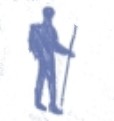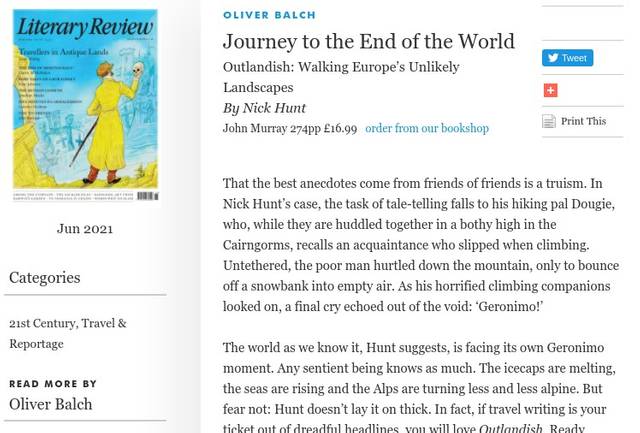Published: May 3, 2021
Oliver Balch has given Outlandish a great write-up in the Literary Review, reproduced below. He picked up on the ‘Geronimo’ strand that runs through the book, and, like William Atkins in the Financial Times, read thoughtfully and deeply. I couldn’t be happier.
That the best anecdotes come from friends of friends is a truism. In Nick Hunt’s case, the task of tale-telling falls to his hiking pal Dougie, who, while they are huddled together in a bothy high in the Cairngorms, recalls an acquaintance who slipped when climbing. Untethered, the poor man hurtled down the mountain, only to bounce off a snowbank into empty air. As his horrified climbing companions looked on, a final cry echoed out of the void: ‘Geronimo!’
The world as we know it, Hunt suggests, is facing its own Geronimo moment. Any sentient being knows as much. The icecaps are melting, the seas are rising and the Alps are turning less and less alpine. But fear not: Hunt doesn’t lay it on thick. In fact, if travel writing is your ticket out of dreadful headlines, you will love Outlandish. Ready yourself to be transported to a puzzling, preternatural world of Standing Eagles and pagan gods, reindeer herds and polytunnel pampas – all, more or less, on your doorstep.
After a trip to Dungeness, a place where the sea boils and the setting sun wobbles, Hunt struck on the notion that the far-flung can also be the nearby. Why travel to the Sahara, he muses, when you can go to Kent?
The search for ‘altogether elsewhere’ places near at hand takes him to the snowy peaks of Scotland (‘an exclave of the Arctic’), the temperate forests of Poland (a ‘primeval wildwood’), the deserts of southeast Spain (a ‘false Arabia’) and, finally, the plains of Hungary (‘a piece of Asia stranded in the heart of Europe’). It’s a neat conceit, especially for the ‘reduced times’ in which we live, when every mountain has been bagged (so says Hunt, whose great-uncle led the first ascent of Everest) and every desert crossed.
Finding all these geographic anomalies squashed so close together is as illuminating as it is dislocating. Knowing that Europe still has bison prowling its woods and that Mongolian gods fill its skies makes not only the foreign feel less foreign but also the domestic less domestic. Hunt’s love of folk stories and etymology serves to enhance the sense of deep, rather than distant, travel. As a guide, he is never too busy to stop for a historical curiosity here or juicy legend there: Scotland’s yeti-like Am Fear Liath Mòr (‘Big Grey Man’), for instance, or Poland’s hairy forest guardian, Leszy.
Outlandlish cements Hunt’s reputation as a stellar writer about nature as well as travel. A bubble moon is ‘the colour of a tired eye’. The Scottish air tastes ‘like a wet knife’. The sound of cattle munching provides ‘a kind of aural massage’. Here he is describing the Scottish tundra (a word that carries ‘the double-thump of the shaman’s drum’) as the ice thaws in the summer sun:
“without the concealing cover of white an astonishing richness is revealed … seeping crimson rustwort like some bloody internal organ; alien jungles of fork-moss that pulses algal green; the fleshy lobes of monster pawwort; splatters of lurid lichen.”
He is funny too. Sheltering from the icy wind in a mountain refuge in the Cairngorms, he spies that someone has graffitied on the wall a phone number and an offer of ‘sexy fun’. Looking at the ‘barren wastes’ outside, he ‘can only admire their optimism’. Another time, we find him visiting Andalusia’s Texas Hollywood, an improvised theme park situated on the site of a former film set (built for the making of A Fistful of Dollars, the 1964 movie that shot Clint Eastwood to fame and the first of dozens of spaghetti westerns to be filmed in the area). His description of the main show, featuring swaggering sheriffs and ‘masturbatory gun-twiddling’, is witheringly funny. But it’s also tenderly observed. This is a kind of ‘cowboy mystery play’, he decides, as ritualised and choreographed as a religious procession.
Hunt may be clever and witty, but he is never shy of the occasional jolting prod. Enter today’s climate crisis. It’s there on every page, sometimes upfront (Scotland’s glaciers emit a ‘terminable dribble’), but more often in the background, lurking, pressing, whispering. On his trip to Hungary, he sits with a German birdwatcher when a red-footed falcon flies overhead. Later, the pair share a drunken late-night lament about the planet’s rapid demise. Hunt even cries. Denialism, he admits, is less painful: ‘It is easier to believe that this bird will always be hanging there, suspended in unchanging times, an immutable feature of the air.’ Only it won’t. That’s the hard message behind Hunt’s prose. Each outlandish location he visits provides either a reminder of what is disappearing (snow, forests, grasslands) or a presage of what is coming (heat, droughts, mass migration).
We live in a time of flux. The wilds are becoming tame; the tame is becoming wild. In a world of Arctic fires and melting permafrost, nothing is stable. Take Siberia’s ice fields: ‘No longer perma. No longer frost. An end to permanence.’ As a species, we are hurtling to the edge. Miraculously, the friend of Hunt’s friend survived. If we manage to do the same, it will be in a small way thanks to delicate, devastating books like this.


